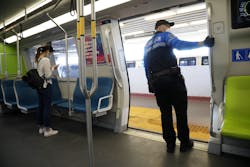BART PD to adopt all recommendations from new Center for Policing Equity report
The Bay Area Rapid Transit (BART) Police Department (BPD) will adopt all six recommendations included in the released analysis of the department's practices and behaviors conducted by the Center for Policing Equity (CPE).
BPD is the first transit law enforcement agency in the country to undergo such a review by the Center for Policing Equity. BPD voluntarily agreed to this process with the hope the findings would form the foundation of a data-driven approach to ensuring equitable policing. The report, which analyzes BPD data from 2012 through 2017, will be presented to the BART Board of Directors Jan. 14 and is available to the public.
“The foundation of my vision for safety at BART is my personal commitment to progressive policing, a commitment that is shared by the men and women of my department,” said BART Police Chief Ed Alvarez. “I take the findings of this report seriously and look at them as an initial benchmark against which future progress can be measured. This is a critical step in our journey to fully ensure BPD is engaging in equitable policing.”
The Center for Policing Equity has shared the following recommendations with BPD:
- Update use of force, stops and searches data collection.
- Require supervisor review of stop records.
- Review fare enforcement policies.
- Adopt a new policy on drawing or displaying firearms.
- Further examine the causes of distrust with the community.
- Collaborate with other officials including the BART Office of the Independent Police Auditor and the BART Police Citizen Review Board.
The Center for Policing Equity is a research and action organization that produces analyses identifying and reducing the causes of racial disparities in law enforcement. BPD began its relationship with the Center for Policing Equity in 2012 when CPE trainers conducted a workshop on the masculinity threat in policing. BPD began sharing data with CPE in 2015 as part of the National Justice Database.
Also, at the BART Board meeting, directors will get an update on new initiatives BPD is pursuing to bolster its progressive policing efforts. The action plan calls for the implementation of crisis intervention teams, the development of a districtwide homelessness action plan and a redeployment strategy to place more officers onboard trains. The plan is based on extensive stakeholder engagement that included public meetings in all nine BART districts.
